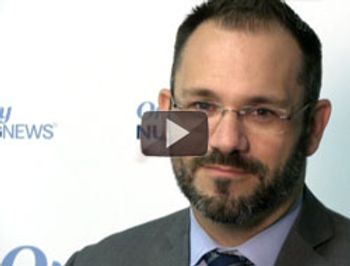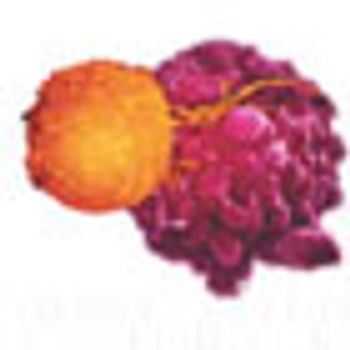
The FDA has approved the first-in-class oncolytic viral therapy Imlygic (T-VEC; talimogene laherparepvec) for the local treatment of unresectable lesions of the skin and lymph nodes in patients with melanoma that recurred after initial surgery.

The FDA has approved the first-in-class oncolytic viral therapy Imlygic (T-VEC; talimogene laherparepvec) for the local treatment of unresectable lesions of the skin and lymph nodes in patients with melanoma that recurred after initial surgery.

Suresh S. Ramalingam, MD, discusses important considerations for patients, caregivers, nurses and physicians when treatment with an immunotherapy begins.

A phase III trial evaluating the efficacy of nivolumab (Opdivo) for the treatment of advanced renal cell carcinoma has been stopped early after the immunotherapy agent demonstrated a survival advantage over the comparator drug, everolimus (Afinitor), in the CheckMate-025 trial.

As immunotherapy expands into the treatment for many cancer types, how will this impact oncology nursing practice?

Marianne Davies, RN, MSN, ACNP, AOCN, Smilow Cancer Hospital, Yale School of Nursing, discusses the side effects associated with immunotherapy.

The FDA has approved nivolumab (Opdivo) for the treatment of patients with advanced squamous non–small cell lung cancer (NSCLC) who have progressed on or after platinum-based chemotherapy.

Marianne Davies, RN, MSN, ACNP, AOCN, Smilow Cancer Hospital, Yale School of Nursing, discusses the challenges of managing side effects from immunotherapy treatments.

Matthew Burke, MBA, RN, MSN, APRN-BC, Oncology Nurse Practitioner/Melanoma and Renal Cell Carcinoma, Yale New Haven Hospital, discusses potential challenges nurses might face with the new advent on immunotherapy.

Rajni Kannan, BS, MS, RN, ANP-BC, Perlmutter Cancer Center at NYU Langone, gives an overview of immune related adverse events (IRAEs).

Scott Santarella, president, CEO, Bonnie J. Addario Lung Cancer Foundation, discusses some exciting updates in the field of lung cancer.

Matthew Burke, MBA, RN, MSN, APRN-BC, Oncology Nurse Practitioner/Melanoma and Renal Cell Carcinoma, Yale New Haven Hospital, discusses managing immune-mediated adverse events (IMAEs)

Advances in precision medicine for the treatment of melanoma include novel small-molecule inhibitors targeting signal transduction pathways in BRAF and NRAS mutations and cutting-edge drugs in the area of immune-modulation, whereby the patient's own immune system is mobilized to attack the tumor.

Matthew Burke, MBA, RN, MSN, APRN-BC, Oncology Nurse Practitioner/Melanoma and Renal Cell Carcinoma, Yale New Haven Hospital, discusses the difference between adverse events caused by chemotherapy and immunotherapy.

Matthew Burke, MBA, RN, MSN, APRN-BC, Oncology Nurse Practitioner/Melanoma and Renal Cell Carincoma, Yale-New Haven Hospital, discusses the prevalence of immunotherapy-related adverse events.

As more immunotherapies move from the bench to the bedside, oncology nurses need to develop a thorough understanding of how these treatments work, as well as how their adverse event profiles differ from those typically seen with traditional cytotoxic regimens

The "renaissance in immunology" is already affecting treatment paradigms for a variety of gynecologic cancers, and the impact is only likely to expand

The results emerging from the PD-1/PD-L1 trials mark a major step forward, noted Rajni Kannan, MN, RN, ANP, in a recent interview on the implications of this research for multiple cancers, including melanoma

The FDA's approval in 2010 of sipuleucel-T (Provenge) marked a milestone in the treatment of men with advanced prostate cancer and ushered in an exciting new immunotherapeutic treatment approach.

Immunotherapy has become an increasingly appealing therapeutic strategy for patients with cancer, with many late-stage clinical trials demonstrating overall survival (OS) advantages in melanoma and castration-resistant prostate cancer.

In April 2010, the FDA approved sipuleucel-T for patients with castration-resistant and metastatic prostate cancer, providing a new treatment that would help the body fight its own cancer.